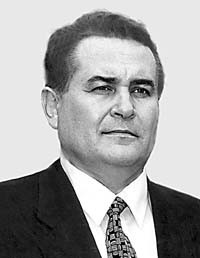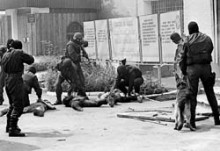I well remember that day, March 25, 1992, when Leonid Kravchuk, finally as president of Ukraine, signed the law on the SBU. In fact, it was called at the time Security and Defense Service and passing the bill was a long and difficult process. A special parliamentary committee was formed, chaired by Vasyl Durdynets and composed of people representing all political forces in that tempestuous and motley parliament. All officers of the Ukrainian KGB had been fired and the KGB disbanded as decided by Verkhovna Rada after the abortive Moscow putsch of mid-1991. I was no longer with the KGB at the time but was minister of state security, defense, and emergency situations in the Fokin cabinet. Kravchuk was chairman of the Verkhovna Rada and there was no presidency (it would be instituted on December 1, 1991). The Durdynets committee meticulously sorted through the KGB files. Something had to be done about the secret archives, agents’ card files, special equipment, etc.. But what? And what about manpower? What was left of an extremely sophisticated clandestine agency had to be reshaped somehow and made to serve Ukraine and its people.
Keeping the archives was extremely important, as there were many wishing to get there.
On November 6, 1991, Leonid Kravchuk, still as Verkhovna Rada chairman, proposed my candidacy as chief of the new security service in the parliament. This was preceded by long talks, interviews with lawmakers, including Vitold Fokin and Mr. Kravchuk.
The vote turnout was 307 ayes, so I took office as of November 6, 1991. Incidentally, I was appointed SBU chief not by the president but by parliament (there was still no president). I think everyone can understand what my appointment implied, considering the sharp differences in Verkhovna Rada at the time.
The fact that I was appointed by parliament was very important to me, and I did my best to form the SBU legal framework, relying on the experience of the developed democratic countries, securing reliable oversight procedures.
There were very many problems, ones never experienced by anyone in my position. The biggest problem, of course, was the law on the SBU. Quite often my office on Volodymyrska Street turned into a miniature Verkhovna Rada, with boiling passions as a score of lawmakers debated every article of the bill.
There were critical moments. For example, a large number of the committee members insisted on a separate article denying personal allowances to all KGB officers and appointing regular pensions instead. I was against it, but memories of the Moscow putsch were fresh and the KGB reputation was anything but good. I persisted in my stand and had to hear a lot of unpleasant words. But I knew we could not allow it; on the one hand, it would be an act of extreme injustice. Meant as a kind of punishment, this clause would be a campaign against all secret police officers, whether or not guilty of wrongdoing against the people. On the other hand, it would be hazardous for the young state. There were hotheads proposing to dismiss all the KGB people and not hire them for the SBU. I thought this a very risky proposal and even said I would resign if it were accepted. This was at the beginning of 1992. There were large Soviet contingents and powerful special KGB units stationed in Ukraine. Also, one had to bear in mind the KGB officer’s mentality.
The absence of a civilized SBU legal framework could have resulted in a situation in which the opposition in a young independent Ukraine would transform into an aggressive and very qualified grouping. There was every indication that such a grouping would have slowed Ukraine’s democratic rebirth, causing much damage. Once again I took the floor and said what I had to say. The deputies were silent and then two representing very different political groups supported me: Larysa Skoryk and Mykola Biloblotsky. Each had distinct arguments, but it got the ball rolling. I had learned the SBU bill by rote. Every article was the result of backbreaking toil, so almost all possible questions from the [parliamentary] audience were predictable. Yet the debate turned out much more stormy than foreseen.
We passed the first reading owing to the bill’s ideology and European experience which we had actively incorporated. But mostly thanks to the participation of numerous legislators in the drafting of the document. Special thanks are due People’s Deputies Oleksandr Yemets (God rest his soul), Mykhailo Horyn, Larysa Skoryk, and Mykola Biloblotsky.
Vasyl Durdynets contributed most tangibly in shaping the bill and passing it in parliament. As chairman of the VR defense and state security committee, he presented the bill in the second reading. I was in the government row and had to answer numerous questions. Article 25 and particularly Clauses 7, 8, 9, and 10 caused the most heated debate, for they governed open and secret operations, cooperation with Ukrainian citizens and other persons, and leasing dwellings and other premises. Passing them in that extremely dynamic and faultfinding parliament was extremely difficult.
I remember proposing an amendment to Article 35, concerning the amenability of SBU men. The bill was practically ready, discussed in depth by the special parliamentary committee. It was to be presented to the full house the next day. What I proposed was a sentence stated as follows: “They [SBU officers and men] shall refuse to carry out any such orders, instructions or directive as may be at variance with the current legislation.” The idea seemed to speak for itself, yet some did not understand it. There I was, head of SBU, submitting a self-evident clause, but I could see dour expressions, as though saying what’s this stuff for, you know better than anyone else that operatives walk the edge of the law. What you propose will restrain their operative creativity. However, I was backed by Vasyl Durdynets. And so Article 35 of the law on the SBU of March 25, 1992 forbids all SBU officers and men, ranging from the director of the SBU to junior operatives, to carry out any orders or instructions contradicting any of the laws currently in effect; those breaching the clause are to be criminally prosecuted. In fact, when read out in parliament, the clause called forth no objections.
I was perfectly convinced that any temptation to take advantage of secret police resources, either by politicians or the SBU command, should be prohibeted by the law. Yet I could not have foreseen the problem arising in such sharp focus six or seven years later, when Leonid Derkach became chief of the SBU. He applied the powerful resources of the secret police to push through and cover his son Andriy’s business, actually plunging the clandestine agency into the political process. I will not speak about misinforming the president.
As many other professionals who spared neither time nor energy to shape the SBU, I was pained to watch and hear it turn into a laughing stock, target of anecdotes, like the one about the mushroom hunters, actually getting involved with the cassette scandal. It was then the agency’s professional level registered a sharp decline and its chief Leonid Derkach’s public appearances at various meetings, conferences, even in parliament turned into stand-up comedy routines, when President Kuchma had to admonish him in public.
I also remember well the hard way we had to put together the Alfa elite military force. President Leonid Kravchuk wanted to know every detail. I had to do a lot of explaining and then submitted a draft regulation. He returned it several times for revision and finally signed a corresponding edict. Using the elite force was strictly regulated, mostly with the president’s knowledge and consent or on his explicit orders. Alfa took part in the transport of hryvnias from Canada and France. It was an extremely sophisticated special operation. Alfa was directly involved in events in the Crimea when Ukrainian sovereignty was endangered. I was in charge of those operations as SBU chief, acting on President Kravchuk’s instructions, so I had to be on the scene, making trips to France or the Crimea.
So you can imagine what I felt on learning that the elite military force spent more than two years guarding Andriy Derkach, son of the SBU chief, under whatever pretext. At first I just couldn’t believe it, but then I received documentary evidence. And I can just imagine how the Alfa men felt about that particular special operation.
The SBU reputation reached its ebb, and I know how painfully many decent officers took it, for they saw and understood everything, especially when ordered to carry out stupid orders or write ridiculous reports (sometimes even having to act contrary to Article 35).
Fortunately, all of this is history now, although there is still a lot of cleaning the stables to be done.
There are many honest, professional and patriotic SBU men still on payroll, officers, generals, and civilian employees. They are dedicated to their complicated work, doing their best to serve and protect the nation’s sovereignty and national interests. They deserve all possible praise and support. A lot has been done to uphold SBU prestige by men currently in retirement, but that’s a separate story.
I am convinced that everything blemishing its reputation is like accidental sediment; it will vanish with time.
On the eve of SBU’s tenth anniversary, I wish every officer to remain firm in the belief that he or she is serving an extremely important cause; that their work will be duly assessed and they will have reason to be proud of working for the Security Service of Ukraine. I wish them all the best of health, optimism, and confidence.








